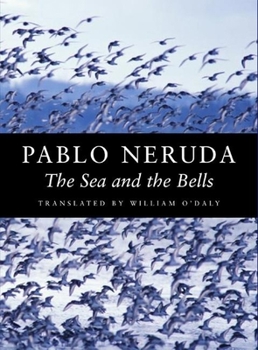The Sea and the Bells
Select Format
Select Condition 
Book Overview
The sound of ships' bells, sea waves, and migratory birds fuel Neruda's longing to retreat from life's noisy busyness. Stripped to essentials, these poems are some of the last Neruda ever wrote, as he pulled one dream out of another. Includes the final lovesong to his wife, written in the past tense: It was beautiful to live / When you lived! Bilingual with introduction. Deeply personal, expansive, and universal... majestic and understated...
Format:Paperback
Language:English
ISBN:1556591624
ISBN13:9781556591624
Release Date:January 2002
Publisher:Copper Canyon Press
Length:124 Pages
Weight:0.40 lbs.
Dimensions:0.4" x 5.6" x 7.5"
Customer Reviews
2 ratings
The Best Poetry Collection I've Ever Read
Published by Thriftbooks.com User , 21 years ago
The Sea and The Bells is the best poetry collection I've ever read. Uncompleted at the time of Neruda's death, only 1/3 of the poems in this collection were titled. However, the wisdom and eloquence with which Neruda worked in the last year of his life is without peer in the canon of 20th century poetry. His "Finale" written on his deathbed to his wife, Matilde, is devastating. Neruda's balance of humor, power, spirituality, compassion and love is so clear in a few of these poems, you may find these poems like little prayers on which you can meditate. For example:If each day fallsinside each night,there exists a wellwhere clarity is imprisoned.We need to sit on the rim of the well of darknessand fish for fallen lightwith patience.Maybe it's just me, but this kind of poetry reads like the wise words of a Buddhist monk high in the mountains of Nepal, man. This collection is the deaf, dope jam.The only criticism I have is with the translation. William O'Daly makes several unusually bland decisions in translating from the original Spanish. For example, Neruda literally writes in We Are Waiting "o para asesinarnos de inmediato" where the verb "assassinate" is pretty darn clear. The phrase literally translates "or to immediately assassinate us." Given the political tension Neruda was writing under having won the Nobel Prize and having returned to Chile, it is reasonably clear why he used the word "assassinate." O'Daly's translation reads: "or to instantly murder us" opting for the bland general word "murder" rather than the clear, stronger word "assassinate." O'Daly makes similarly odd decisions throughout the text. Fortunately, the original Spanish appears alongside O'Daly's translation so you can read what Neruda actually wrote.Beyond the translation, this is the best poetry collection I have ever read. I highly recommend it to anyone who appreciates language being used at its absolute finest. The Sea and The Bells raises the bar for all of us. Read it, and enjoy!Stacey
"One returns to the self as to an old house..."
Published by Thriftbooks.com User , 24 years ago
I have to disagree entirely with the reviewer below. If he is pining for the wild exuberances characteristics of earlier stages in Neruda's writings, he should not look for it here: for all their wordplay, these last books of Neruda's (the handful he worked on simultaneously during the last year of his life) are about preparing for death. I've noticed here and there some nuance which seemed not to have caught the translator's eye, but otherwise he has made a remarkably rewarding transation of the ruminative, supple-then-lurching tone of PN's Spanish. "The Sea and the Bells" is a crockpot of mystery, a book to read and learn slowly over years.




